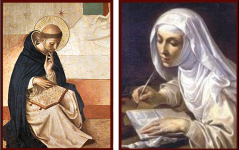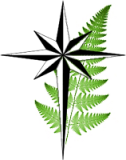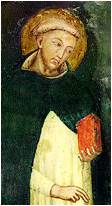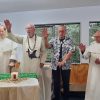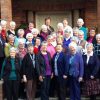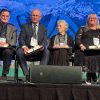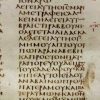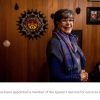 DOMINICAN LAITY
DOMINICAN LAITY
Newsletter #10
March 2010
Dear members of the New Zealand Dominican family
Now is your chance to join other lay Dominicans in the first national meeting, to discuss the future of the lay Dominican movement in New Zealand.
This invitation is for YOU!
We need you to join with other people to consider how we as lay Dominicans can carry the gift given us by St Dominic and St Catherine, into New Zealand in the 21st century, as part of a family with the friars and sisters. If you think this is important, then this gathering is for you!
WHEN? From the evening of Friday 30 April, all day Saturday, to the afternoon of Sunday 2 May. Start time: 7.00pm Friday.
WHERE? Our Lady’s Home of Compassion, Rhine St, Island Bay, Wellington.
COSTS? $160 per person – covers two nights accommodation and all meals and extras.
If you intend to arrange your own accommodation and attend the meetings, you can have meals only: Saturday day charge $35, Sunday day charge $20
FINANCIAL HELP IS AVAILABLE IF YOU NEED IT – SEE NOTE BELOW.
PAYMENT? . By cheque or direct credit.
Cheques to be made out to New Zealand Dominican Sisters – Wellington.
Send cheques to us at PO Box 346, Masterton.
Direct debit can be make to New Zealand Dominican Sisters, at the ANZ Bank, number 010902 0055000. If you use direct debit, make sure you record your name on the
record, and please inform us (Jenny and me) that you have done so (otherwise we may just miss that you have paid. )
The venue: The Home of Compassion has accommodation for up to 25 people, as follows:
3 rooms with double beds, 7 rooms with twin beds, 5 rooms with single beds.
The rooms are very comfortable. All on ground floor. Every room has a wash basin. Toilets and showers are very close to every room.
All meals will be provided.
We would like to be able to meet the needs of everyone, but it would be extremely difficult if everyone requires their own single room! We would ask you to be as flexible as possible. Married couples are easy to accommodate, but if you are coming with someone you know please consider asking for a twin room. Otherwise we could not manage.
If you are arriving by air, we may be able to pick you up – let us know.
Below you can find:
- a draft agenda
- A statement called the Masterton Vision, which was the outcome of the initial meeting held by some lay Dominicans in March 2008.
TWO IMPORTANT NOTICES:
We do not want lack of funds to prevent anyone from coming. We have access to some funding to assist people who would love to come but might be prevented by costs. Please contact us to discuss if you are in this category.
We need to have a firm indication of who is coming by Holy Thursday, 1 April.
Please contact us before then.
Dominican Laity Weekend Draft Programme
Friday evening 30 April
7.30pm Introductions
Who are we? Where are we from? What are our connections with the Dominican family?
Saturday 1 May
9am Assemble
Shared prayer
Session 1
The Dominicantradition and charism
What can they mean for us today?
Session 2
“Preaching the good news” to the contemporary world
How can we part of the preaching mission of the Dominican order?
Lunch
Session 3
“Formation programme” for those interested in Dominican order
How might we and others find out more about the Dominican tradition?
Vigil Mass for Sunday
Dinner
Sunday 2 May
9am Assemble
Session 4
Aims and principles for a lay Dominican movement
What do we think of those proposed so far? What else do we suggest?
Session 5
The practicalities of a Dominican lay movement in Aotearoa/New Zealand
What structures do we need to set in place?
Lunch
2pm Closing prayer and farewells
Towards a vision for New Zealand Lay Dominicans
On 8 March 2008, a small group of people devoted to the Dominican charism, met in Masterton to discuss the possibility of building a lay connection. The group identified the following starting points:
St Dominic, by Fra Angelico
valuing the quest for truth
responding to the signs of the times
spirituality and theology rooted in what we are living
coming together in groups
considering: how do we ‘preach’, and the many dimensions of that
freedom for the involvement of the laity in the mission of the church and the Order
deepening and nurturing our vocation in life
recognition of the variety of vocations
freeing the life that is in the church
community prayer as fundamental
commitment to the four pillars: prayer, community, study, and preaching
the importance of the Dominican charism continuing in Aotearoa /New Zealand.
To contribute to the ongoing life of the Dominican charism in Aotearoa /New Zealand
To create spaces where we can respond, and enable others to respond, to the signs of the times
To live and promote the four pillars of Dominican life: prayer, study, community, and preaching.
To promote a theology based on finding God in the world around us (an incarnational theology)
To recognise and promote the sense of belonging to the Dominican family
To affirm and support the prophetic voices and actions
To be part of the Dominican prophetic voice – within our church and society.
We then considered what might be the aims of a national lay Dominican movement. The following is the vision articulated by those people.
Rainbow above Mt Dick, appeared at the end of the initial meeting on 8 March 2008.
We offer these thoughts as an OPENER for discussion.
KORIMAKO
This month we are privileged to have An item about a wonderful example of true Dominican spirituality-in-action. Sr Judith Robinson OP lives, loves and shares a life on Korimako Farm in Invercargill. This wonderful place is a base from which she is able to reach out with the hand of creation theology to the world around her – a world, even the secular one, that finds great value in what Judith is able to share.
The Dominican motto Truth spelt out in the longer To contemplate and share with others the fruits of our contemplation has been part of our preaching mission for over 800 centuries. The justice issues regarding our planet and the physical and social care for the environment was and is at the heart of the birth of KORIMAKO. This is our five acre farmlet on the outskirts of Invercargill. Here our challenge is to find creative ways of being in an eco-spirituality where justice and care for the earth and all its inhabitants is honoured.
Apart from the nine years of trying to live a sustainable lifestyle with many hours developing the property and teaching eco-spirituality, we have been instrumental in making known the Earth Charter and creating and distributing over 600 Earth Charter Summary Posters throughout the country. The Earth Charter’s inclusive ethical vision recognizes that environmental protection, human rights, equitable human development and peace are interdependent and indivisible. The Charter provides a framework for thinking about and addressing these issues.
Sr Judith leads the way
During the past year the National Government has made clear that their primary goal is “ to raise the standard of living of New Zealander’s through strong economic growth.” (The Press 9 February 2009) Many think of economics as the art of making money ie the science of producing, distributing and consuming wealth. The Greek word for economics is oikonomia, the art of caring and managing the household- the community, a society, or the Earth. In fact, economics shares a common root with ecology, the study of the home. (ref The Tao of Liberation, Mark Hathaway and Leonardo Boff Orbis Books, Maryknoll, NY 2009)
Our economics today is about profit, accumulating wealth for the few to the detriment of the mass and Earth’s living systems. The economic system rides rough shod over indigenous cultures with their wisdom and local knowledge, languages, creativity, habitats, plant and animal species. Indeed this Government is now working at ways of removing restraints built up in past years that prevent resources being used productively for financial gain. Hence, the magnifying glass is being poised over minerals to mine in Crown-owned land, oil in our off shores, and our many rivers, beaches, forests and mountains.
Korimako is part of many groups in the south trying to practice and educate for a change in the way we think, view and utilise earth’s resources. We are creating a Food Forest and community garden, The Marinonga (Harmony) Sanctuary in the back paddock in partnership with the already established Peace Garden in the front paddock. It also is a meeting place for the Permaculture group and the Steering Group for Transition Town Invercargill. Transition Initiatives are about increasing communities resilience to the challenges and opportunities of Peak Oil, Climate Change and economic shocks. The TTI Committee meet here monthly to study, reflect and plan the monthly workshops we hold in the city. Some members are helping here in the community garden and last week we opened and had a local Kaumatua bless the new TTI Community Garden in the Kew Bush which is part of the local hospital grounds.
These gardens will be gathering places for people to share knowledge and skills as well as produce. We try to avoid money by donating and sharing seeds, tools, time and energy! People also carpool, bike or walk, thus we are encouraging others to be “energy-wise.” Permaculture, organic and biodynamic practices are being studied and used by members. Each year the new Go Organic study group visits Korimako to view the Peace Garden the developing permaculture and biodynamic practices, composting, worm farm and liquid manures used on our five acres.
There is no reason why a lower-energy future with a more local economy needs to have a lower quality of life than the present (despite the massive number of advertisements that encourage us to consume and own more “stuff”!). In fact, it may be in many ways preferable to the present rushed lifestyle which leaves little time for listening, reflection, stillness and to just BE.
Finally, Korimako has a Cosmic Walk whereby children and adults can take a meditative walk through the story of the evolving universe and hopefully recognize the sacred, diverse, interconnectedness in the Universe Story, Earth Story and our place as kaitiaki (guardians) of our precious planet. We face enormous challenges in the 21st century and communities of hope can be vibrant, happy and healthy individuals. Dominic, the joyful friar was one such man.
Judith Robinson OP
Lenten Blessings
Mike Kelly and Jenny Wilson
Co-ordinators
Ph 06 370 2084
Email: kelly-wilson@ihug.co.nz
